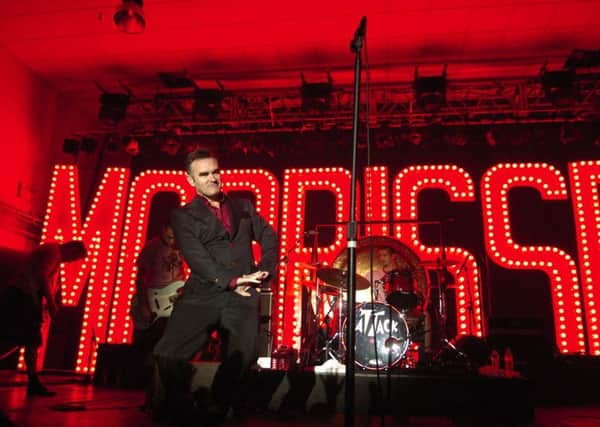Morrissey’s autobiography comes out on top in 2013


You could make a very good case for Bob Dylan’s Chronicles being the rock event of 2004 and for Keith Richards’ Life being the rock event of 2010 – and only marginally less of one for Rod Stewart’s Rod being the biggie of last year. In 2013, maybe the event went back to being an album – David Bowie’s The Next Day – and maybe the next thing we’d want from not-dead-yet Dame David would be his memoirs. Until then, we have Autobiography by Morrissey (Penguin, £8.99), a book begging to have “Quite possibly the greatest rockbiz biog ever” plastered across the cover.
He almost gets the blurb from me, which is pretty good going, considering a) I wasn’t a fan of the Smiths; b) even the diehards concede that without sidekick Johnny Marr the magic has largely gone; c) presumptuously, bumptiously and instantaneously, the book is supposed to be a Penguin Classic. Autobiography is not classic when placed next to Dickens or Orwell but there is writing here that other rock stars, more successful and more important ones, could only dream of. You get it on the very first page. “We live in forgotten Victorian knife-plunging Manchester” is Morrissey striving, and succeeding, for toerag reminisces every bit as vivid as Richards managed. If any more rockers do this there will be enough of them to recreate that Monty Python sketch about competitive deprivation: “Hole in the ground, you say? We got evicted from ours.”
Advertisement
Hide AdI was going to say that the knife is plunged in the first paragraph, which is technically true, but the paragraph is an elastic concept for Mozza. The first is still running on page 10. There are no chapter headings and no index. You cannot skip and dip. Mozza wants you to commit to his story. Then, when it’s time for him to talk about the Smiths, this section is over far too quickly. Or not quickly enough if you count the spat with drummer Mike Joyce, which takes up 40 pages.
But earlier on, before it all went wrong, he’s brilliant on waiting for fame and in dead-end jobs in the dreary 1970s surrounded by lots of people much fatter than him (“Dunlop bloaters … Goblinesque pork-pie chubbos”). He’s brilliant, too, on music, at least when he’s not drooling over the ridiculously overrated New York Dolls. Here he is on Sparks: “Ron Mael sat at a keyboard like an abandoned ventriloquist’s doll and brother Russell sang in French italics with the mad urgency of someone tied to a tree.” Nico’s voice, he reckons, is like “deadly frost … as if the hangman’s hands are at her throat”. Many music critics never get this good. And what’s not to love about a book which references Stingray? (“Like Marina swimming away from Troy Tempest and towards Phones, a small gesture … means so much.”)
Bob Stanley is another musician-turned-critic or rather historian for Yeah Yeah Yeah (Faber, £20), although strictly speaking he wrote for the NME before forming St Etienne. His book is a love letter to the pop song, a 776-pager on the 2mins 30secs chart ditty and if not quite an anti-rock rant he certainly believes that Sweet are every bit as great as Led Zeppelin. If you’ve longed for a compendium giving three mentions to Chicory Tip, even one to Lieutenant Pigeon and reclaiming Gary Glitter from hell (if only for the tragic, double-drumming Glitter Band), this is it. Glitter, by the way, was almost called Horace Hydrogen. Chic were almost called Allah and the Knife-Wielding Punks. Stanley finds the missing link between Bing Crosby and Guns N’ Roses. He’s as good on Vera Lynn as he is on the Sex Pistols, although maybe the story of the penultimate British gig by these unspeakable horrors being a free one on Christmas Day, 1977 for striking Huddersfield firemen’s families when the band handed out skateboards and Johnny Rotten stuck his face in the cake, is the best of many cracking anecdotes. To the tune of “Anarchy in the UK”, Huddersfield Town fans still sing “I wanna be/HTFC.”
Stanley calls the Beatles “the perfect pop group”. After that, what’s left to say about the Fab Four? Lots, according to Mark Lewisohn. In All These Years Vol 1: Tune In (Little Brown, £30) he manages 946 pages on their lives as the prefab four, before they even warbled “Yeah yeah yeah”. They’re the act we’ve known for all these years; some of us carry around potted biogs of this band like kidney donor cards. And yet, as with Stanley’s book, this is a splendid, heroic work, at its best in the Hamburg chapters, taking us deep inside the bierkellers to where George lost his virginity (and the others applauded) and John took to the stage with a loo seat round his neck (though he didn’t, as some thought, urinate on some nuns from a balcony).
Also enjoyed this year: Simon Goddard’s Ziggyology: A Brief History of Ziggy Stardust (Ebury, £20), Linda Ronstadt’s Simple Dreams (Simon & Schuster, £16), Richard Havers’s Verve: The Sound of America (Thames & Hudson, £45) and Donald Fagen’s Eminent Hipsters (Cape, £16.99) – a frustratingly slim volume from the Steely Dan man, maybe the most literate to ever craft a pop song, but as someone once said, small gestures mean so much.